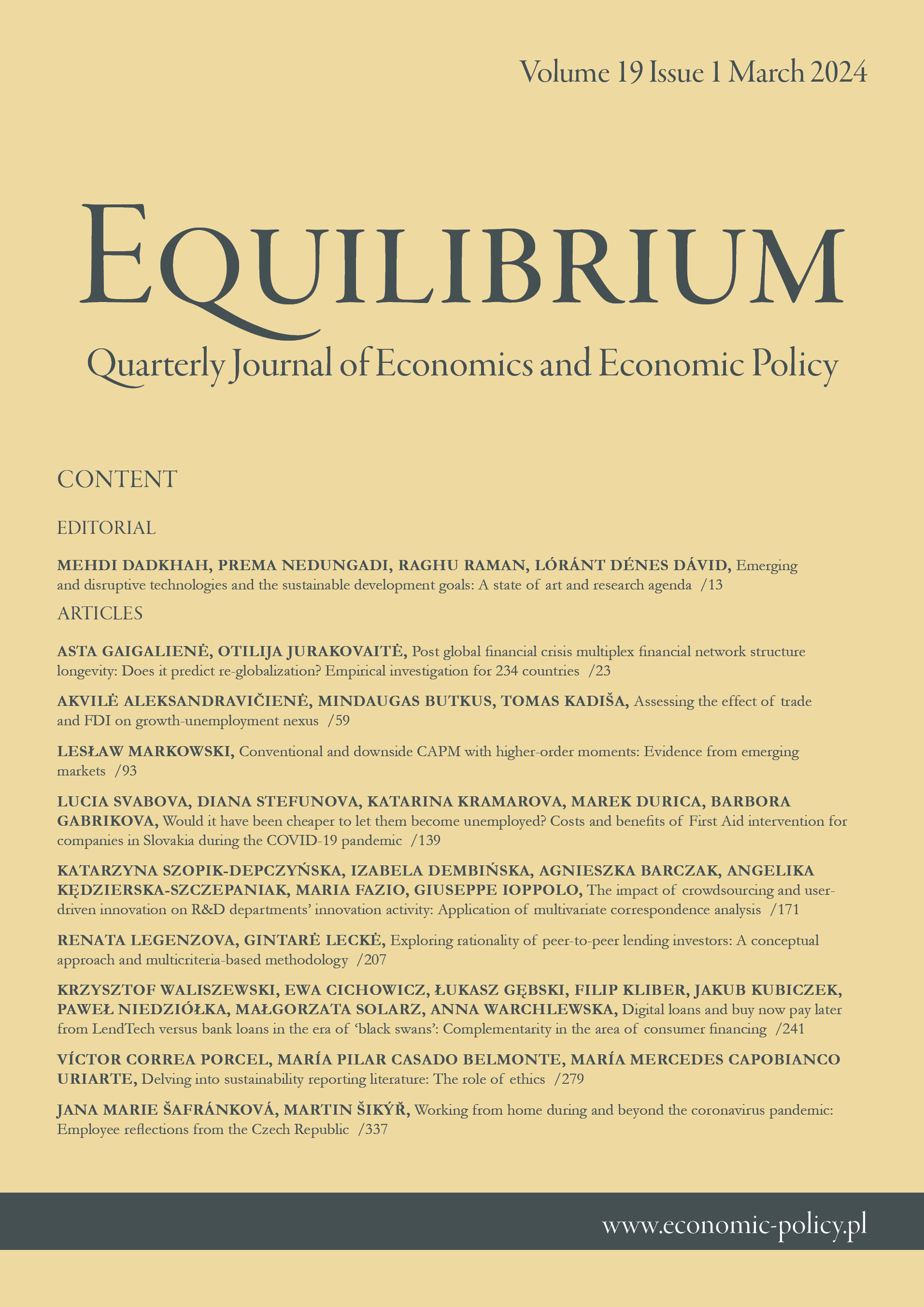新兴欧洲国家的主权信用评级和CDS价差
IF 6.2
Q1 ECONOMICS
Equilibrium-Quarterly Journal of Economics and Economic Policy
Pub Date : 2020-09-07
DOI:10.24136/eq.2020.019
引用次数: 2
摘要
研究背景:主权信用评级在决定任何一个国家?美国进入国际债务市场的渠道。在全球金融危机和欧洲债务危机期间,信用评级机构因公布评级下调的时机和下调幅度而受到严厉批评。因此,对于投资者来说,主权信用评级是否仍然是一个有用的基准值得考虑。本文目的:本文考察了信用评级机构是否仍在为金融市场提供有关新兴欧洲国家政府偿债能力的新信息。此外,它还描述了特定类型的评级事件对金融市场的影响和个别机构对市场形势的影响的差异。我们的研究还侧重于评估在商业周期的不同阶段发生的这些事件。方法:本文使用了2008年至2018年在17个新兴欧洲经济体发生的评级事件的数据。我们考虑了与评级变化相关的正面、中性和负面事件,以及惠誉评级、穆迪?标准普尔(Standard & Poor?s)。我们使用了一种基于事件研究的方法。此外,我们进行了Wilcoxon符号秩检验,并使用logit模型来确定累积调整后的信用违约互换(CDS)价差变化在预测评级变化方向方面的有用性。研究结果与增值:我们的研究提供了证据,证明CDS市场反映了在评级下调宣布前三个月有关政府发行人的信息。评级机构向市场报告的信息仅在短期内与评级下调和上调有关。然而,积极的信用评级变化向市场传达了更多的信息。我们还发现强有力的证据表明,在后危机时期,信用评级为市场提供的信息较少。本文章由计算机程序翻译,如有差异,请以英文原文为准。
Sovereign credit ratings and CDS spreads in Emerging Europe
Research background: Sovereign credit ratings play an important role in determining any country?s access to the international debt market. During the global financial crisis and the European debt crisis, credit rating agencies were harshly criticized for the timing of their announcements regarding ratings downgrades and the ranges of those downgrades. Therefore, it is worth considering whether the sovereign credit rating is still a useful benchmark for investors.
Purpose of the article: This article examines whether credit rating agencies still provide financial markets with new information about the solvency of governments in Emerging Europe countries. In addition, it describes the differences in the effect of particular types of rating events on financial markets and the impact of individual agencies on the market situation. Our study also focuses on evaluating these occurrences at different stages of the business cycle.
Methods: This article uses data about ratings events that took place between 2008 and 2018 in 17 Emerging Europe economies. We took into consideration positive, neutral, and negative events related to ratings changes and the outlooks reported by Fitch Ratings, Moody?s, and Standard & Poor?s. We used a methodology based on event studies. In addition, we performed Wilcoxon signed-ranks test and used a logit model to determine the usefulness of cumulative adjusted credit default swap (CDS) spread changes in predicting the direction of ratings changes.
Findings & Value added: Our research provides evidence that the CDS market reflects information regarding government issuers up to three months before ratings downgrades are announced. Information reported to the market by ratings agencies is only relevant in the short timeframe surrounding ratings downgrades and upgrades. However, positive credit rating changes convey more information to the market. We also found strong evidence that, in the post-crisis period, credit ratings provide markets with less information.
求助全文
通过发布文献求助,成功后即可免费获取论文全文。
去求助
来源期刊
CiteScore
9.20
自引率
3.50%
发文量
28
审稿时长
36 weeks
期刊介绍:
Equilibrium. Quarterly Journal of Economics and Economic Policy is a scientific journal dedicated to economics, which is the result of close cooperation between the Instytut Badań Gospodarczych/Institute of Economic Research (Poland) and Polish Economic Society and leading European universities. The journal constitutes a platform for exchange of views of the scientific community, as well as reflects the current status and trends of world science and economy.
The journal especially welcome empirical articles making use of quantitative methods in: Macroeconomics and Monetary Economics, International Economics, Financial Economics and Banking, Public Economics, Business Economics, Labor and Demographic Economics, Economic Development, and Technological Change, and Growth.
Current most preferable topics and special issues:
The economics of artificial intelligence: business potentials and risks;
Digitalization and entrepreneurship in economics;
Sustainable socio-economic development, environmental and ecological economics;
Transition in the energy market (improving energy efficiency, alternative energy sources, renewable energy, energy security).

 求助内容:
求助内容: 应助结果提醒方式:
应助结果提醒方式:


